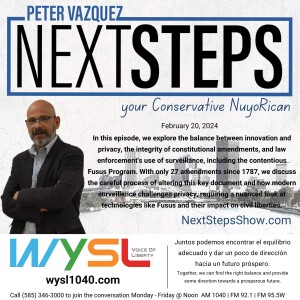
In this episode, we navigate the intricate balance between innovation and privacy, alongside the sanctity of constitutional processes and the evolving landscape of law enforcement surveillance. At the heart of our discussion is the critical importance of preserving the integrity of the Constitutional amendment process. This cornerstone of American democracy ensures that changes to the Constitution reflect a broad consensus, embodying the collective will and values of the populace. With a historical count of only 27 amendments since 1787, the deliberate and judicious nature of this process highlights the profound respect and caution exercised in altering this foundational document.
Turning our attention to the domain of law enforcement, we delve into the increasing reliance on surveillance technologies, exemplified by initiatives like those undertaken by the MC Sheriffs. As strategies for public safety evolve, the incorporation of advanced surveillance tools prompts essential questions about the balance between operational efficiency, privacy, and ethics. Despite the potential benefits for safety and efficiency, the opacity surrounding the deployment and governance of these technologies can lead to apprehensions regarding privacy infringements and the erosion of civil liberties, underscoring the need for a critical appraisal of their application.
A focal point of our exploration is the Fusus Program, a platform that has sparked considerable debate regarding its role in the fabric of modern policing. Positioned as a mechanism to enhance public safety through the integration of video feeds and the potential application of artificial intelligence for real-time analysis, Fusus symbolizes a significant leap in surveillance capability. However, this advancement is met with a spectrum of concerns, from privacy implications to the potential for systemic overreach. The intricacies of Fusus's use, including data retention policies and the ethical deployment of AI, demand a nuanced examination to discern whether it represents a justified tool for law enforcement or an encroachment on personal freedoms.
The conversation around surveillance transparency and the potential for overreach is woven throughout our discussion. This balance between ensuring public safety and upholding individual privacy rights is increasingly relevant in a world where technology's role in our lives is ever-expanding. Deliberations on transparency in surveillance practices, the extent of surveillance powers, and the establishment of mechanisms for public oversight are pivotal in maintaining a society where technological advancements do not compromise fundamental liberties.
This episode endeavors to illuminate the complex interplay of governance, law enforcement surveillance, and the preservation of civil liberties in the digital age, encouraging a thoughtful reflection on how we navigate these critical issues.
#NextStepsShow #PuttingPeopleFirst #ConservativeNuyoRican #CommunityTalk
No comments yet. Be the first to say something!